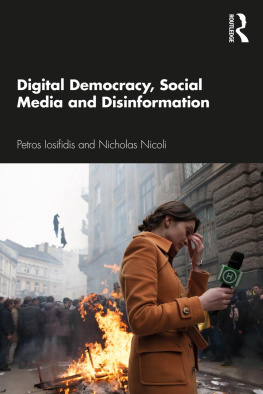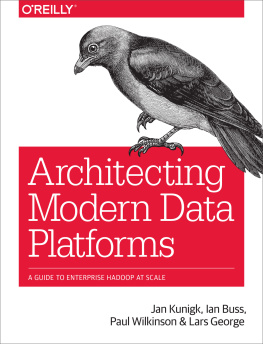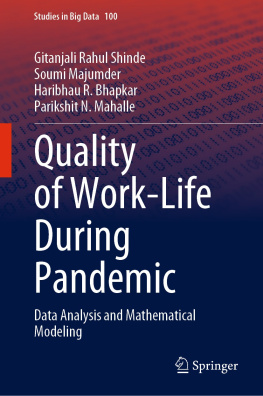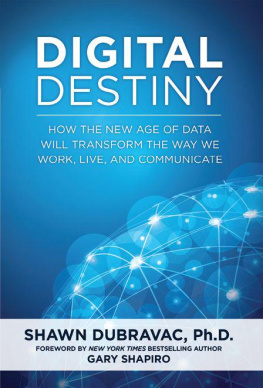
Disinformation and Data Lockdown on Social Platforms
This book addresses the question of how researchers can conduct independent, ethical research on mal-, mis-, and disinformation in a rapidly changing and hostile data environment.
The escalating issue of data access is thrown into sharp relief by the large-scale use of bots, trolls, fake news, and strategies of false amplification, the effects of which are difficult to quantify due to a corporate environment favouring platform lockdowns and the restriction of access to Application Programming Interfaces (APIs). As social media platforms increase obstacles to independent scholarship by dramatically curbing access to APIs, researchers are faced with the stark choice of either limiting their use of trace data or developing new methods of data collection. Without a breakthrough, social media research may go the way of search engine research, in which only a small group of researchers who have direct relationships with search companies such as Google and Microsoft can access data and conduct research.
The chapters in this book were originally published as a special issue of the journal, Information, Communication & Society.
Shawn Walker is Assistant Professor of Data & Society in the School of Social and Behavioral Sciences at Arizona State University.
Dan Mercea is Reader in the Department of Sociology at City, University of London.
Marco Bastos is the University College Dublin Ad Astra Fellow at the School of Information and Communication Studies.
Disinformation and Data Lockdown on Social Platforms
Edited by
Shawn Walker, Dan Mercea and Marco Bastos
First published 2022
by Routledge
605 Third Avenue, New York, NY 10158
and by Routledge
2 Park Square, Milton Park, Abingdon, Oxon OX14 4RN
Routledge is an imprint of the Taylor & Francis Group, an informa business
2022 Taylor & Francis
All rights reserved. No part of this book may be reprinted or reproduced or utilised in any form or by any electronic, mechanical, or other means, now known or hereafter invented, including photocopying and recording, or in any information storage or retrieval system, without permission in writing from the publishers.
Trademark notice: Product or corporate names may be trademarks or registered trademarks, and are used only for identification and explanation without intent to infringe.
Library of Congress Cataloging-in-Publication Data
A catalog record for this title has been requested
ISBN: 978-1-032-07447-4 (hbk)
ISBN: 978-1-032-07448-1 (pbk)
ISBN: 978-1-003-20697-2 (ebk)
DOI: 10.4324/9781003206972
Typeset in Minion Pro
by Newgen Publishing UK
Publishers Note
The publisher accepts responsibility for any inconsistencies that may have arisen during the conversion of this book from journal articles to book chapters, namely the inclusion of journal terminology.
Disclaimer
Every effort has been made to contact copyright holders for their permission to reprint material in this book. The publishers would be grateful to hear from any copyright holder who is not here acknowledged and will undertake to rectify any errors or omissions in future editions of this book.
Contents
Shawn Walker, Dan Mercea and Marco Bastos
Axel Bruns
Cornelius Puschmann
Alexander Halavais
Amelia Acker and Joan Donovan
Fabio Giglietto, Augusto Valeriani, Nicola Righetti and Giada Marino
Nicholas Proferes and Ed Summers
Yiping Xia, Josephine Lukito, Yini Zhang, Chris Wells, Sang Jung Kim and Chau Tong
Citation Information
The chapters in this book were originally published in the journal, Information, Communication & Society, volume 22, issue 11 (2019). When citing this material, please use the original page numbering for each article, as follows:
The disinformation landscape and the lockdown of social platforms
Shawn Walker, Dan Mercea and Marco Bastos
Information, Communication & Society, volume 22, issue 11 (2019), pp. 15311543
After the APIcalypse: social media platforms and their fight against critical scholarly research
Axel Bruns
Information, Communication & Society, volume 22, issue 11 (2019), pp. 15441566
An end to the wild west of social media research: a response to Axel Bruns
Cornelius Puschmann
Information, Communication & Society, volume 22, issue 11 (2019), pp. 15821589
Overcoming terms of service: a proposal for ethical distributed research
Alexander Halavais
Information, Communication & Society, volume 22, issue 11 (2019), pp. 15671581
Data craft: a theory/methods package for critical internet studies
Amelia Acker and Joan Donovan
Information, Communication & Society, volume 22, issue 11 (2019), pp. 15901609
Diverging patterns of interaction around news on social media: insularity and partisanship during the 2018 Italian election campaign
Fabio Giglietto, Augusto Valeriani, Nicola Righetti and Giada Marino
Information, Communication & Society, volume 22, issue 11 (2019), pp. 16101629
Algorithms and agenda-setting in Wikileaks #Podestaemails release
Nicholas Proferes and Ed Summers
Information, Communication & Society, volume 22, issue 11 (2019), pp. 16301645
Disinformation, performed: self-presentation of a Russian IRA account on Twitter
Yiping Xia, Josephine Lukito, Yini Zhang, Chris Wells, Sang Jung Kim and Chau Tong
Information, Communication & Society, volume 22, issue 11 (2019), pp. 16461664
For any permission-related enquiries please visit:
www.tandfonline.com/page/help/permissions
Notes on Contributors
Amelia Acker is Assistant Professor in the School of Information at the University of Texas at Austin. She is an information scientist who researches data literacy, metadata, and information infrastructures that support long-term cultural memory.
Marco Bastos is the University College Dublin Ad Astra Fellow at the School of Information and Communication Studies and Senior Lecturer at City, University of London. He is the author of Spatializing Social Media: Social Networks Online and Offline (Routledge, 2021) and principal investigator in the Twitter-funded project The Brexit Value Space and the Geography of Online Echo Chambers.
Axel Bruns is Professor in the Digital Media Research Centre at Queensland University of Technology in Brisbane, Australia. His work focuses on the study of user participation in social media spaces, and its implications for our understanding of the contemporary public sphere, drawing especially on innovative new methods for analyzing big social data.













